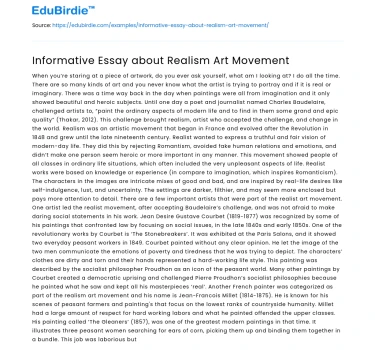When you’re staring at a piece of artwork, do you ever ask yourself, what am I looking at? I do all the time. There are so many kinds of art and you never know what the artist is trying to portray and if it is real or imaginary. There was a time way back in the day when paintings were all from imagination and it only showed beautiful and heroic subjects. Until one day a poet and journalist named Charles Baudelaire, challenged artists to, “paint the ordinary aspects of modern life and to find in them some grand and epic quality” (Thakar, 2012). This challenge brought realism, artist who accepted the challenge, and change in the world.
Realism was an artistic movement that began in France and evolved after the Revolution in 1848 and grew until the late nineteenth century. Realist wanted to express a truthful and fair vision of modern-day life. They did this by rejecting Romantism, avoided fake human relations and emotions, and didn’t make one person seem heroic or more important in any manner. This movement showed people of all classes in ordinary life situations, which often included the very unpleasant aspects of life. Realist works were based on knowledge or experience (in compare to imagination, which inspires Romanticism). The characters in the images are intricate mixes of good and bad, and are inspired by real-life desires like self-indulgence, lust, and uncertainty. The settings are darker, filthier, and may seem more enclosed but pays more attention to detail. There are a few important artists that were part of the realist art movement.
Save your time!
We can take care of your essay
- Proper editing and formatting
- Free revision, title page, and bibliography
- Flexible prices and money-back guarantee
One artist led the realist movement, after accepting Baudelaire’s challenge, and was not afraid to make daring social statements in his work. Jean Desire Gustave Courbet (1819-1877) was recognized by some of his paintings that confronted law by focusing on social issues, in the late 1840s and early 1850s. One of the revolutionary works by Courbet is ‘The Stonebreakers’. It was exhibited at the Paris Salons, and it showed two everyday peasant workers in 1849. Courbet painted without any clear opinion. He let the image of the two men communicate the emotions of poverty and tiredness that he was trying to depict. The characters’ clothes are dirty and torn and their hands represented a hard-working life style. This painting was described by the socialist philosopher Proudhon as an icon of the peasant world. Many other paintings by Courbet created a democratic uprising and challenged Pierre Proudhon’s socialist philosophies because he painted what he saw and kept all his masterpieces ‘real’.
Another French painter was categorized as part of the realism art movement and his name is Jean-Francois Millet (1814-1875). He is known for his scenes of peasant farmers and painting's that focus on the lowest ranks of countryside humanity. Millet had a large amount of respect for hard working labors and what he painted offended the upper classes. His painting called ‘The Gleaners’ (1857), was one of the greatest modern paintings in that time. It illustrates three peasant women searching for ears of corn, picking them up and binding them together in a bundle. This job was laborious but one of the biggest tasks done by peasants. Millet represented class divide by having dark colors up front with the working woman and lighter colors towards the back where the main house and higher class is gathered. Another aspect he included was the colors of the gleaner’s hats. They are painted the color of the flag of the French Republic and it symbolizes the popular Revolution in France.
During the 19th century the broken system was challenged by an increasing number of painters, especially realist artists like Millet, and Gustave Courbet. Their works of art led to a social and political change. Realism depicted the struggles of the working class and Europe’s socio-economic inequality. Realist painting focused on modern issues such as social conditions, rural poverty and the lives of the common people, whereas the intellectual system did not consider such everyday subjects to be worthwhile of depiction. Before the realism movement regular people had only been shown in small scaled paintings, and the monumental canvases represented heroic subjects and pictures of the mighty. The main goal of realism was to portray real, typical people, their problem and situations as accurately and truthfully as it can be.
In the end, I think the realism art movement did exactly what it was trying to do. Realism is defined as the attitude or practice of accepting a situation as it is and being prepared to deal with it accordingly, the quality or fact of. Looking at the French realist art today you don’t have to ask yourself, what am I looking at? Courbet truthfully portrayed ordinary people and places, leaving out the glamour that most French painters at that time added to their works. Because of this, Courbet became known as the leader of the realist movement. Millet’s paintings were greatly admired by French republicans for its dignified and realistic appreciation of the rural poor. With their paintings of real life, they made a statement and changed how many people saw life after the Revolution.






 Stuck on your essay?
Stuck on your essay?

